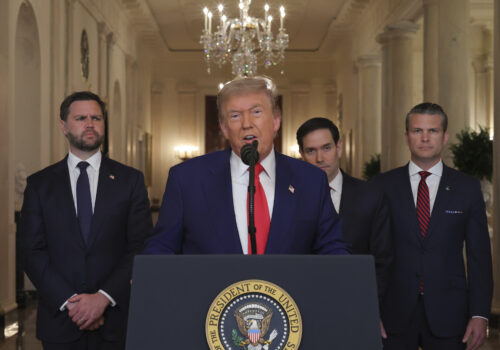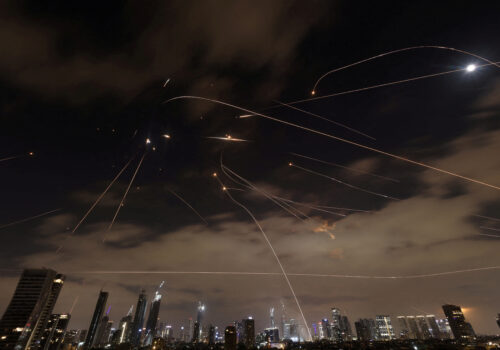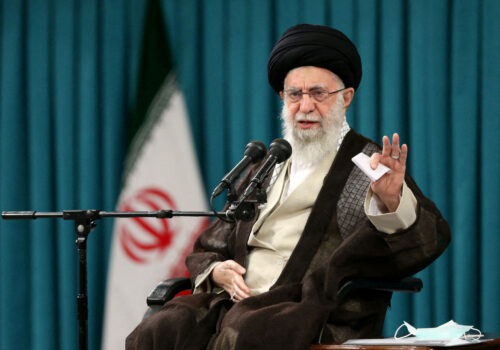Pakistan is maintaining strategic clarity amid the Israel-Iran war
For Pakistan, the escalating Israel-Iran conflict has been a long-time coming, and hence, not entirely a surprise.
Islamabad has paid close attention to Tehran’s nuclear program and missile capabilities for decades, emphasizing Iran’s right to self-defense under the United Nations Charter. But Israel’s attacks across Iran starting June 13 have started a new chapter.
Pakistan now faces the daunting challenge of lending support to Iran without antagonizing Saudi Arabia and the United Arab Emirates, its two biggest financial supporters, and irritating the United States, with whom Pakistan seeks to improve ties. Field Marshal and Chief of Army Staff (COAS) General Asim Munir was just in Washington, DC last week, including a lunch with US President Donald Trump—three days before the United States joined the conflict by bombing Iranian nuclear sites.
Pakistan and Iran share an approximately nine-hundred kilometer border, across the volatile Balochistan region, where both countries have struggled to contain cross-border militant activity. The area has seen decades of separatist unrest, compounded by militant sanctuaries and criminal networks. In January 2024, tensions between Pakistan and Iran increased as Iran launched missile strikes into Pakistan’s Baluchistan, claiming to hit two strongholds of the anti-Iran insurgent group Jaish al-Adl (Army of Justice). The group is well-known for repeatedly orchestrating attacks along the Iran-Pakistan border—but Tehran retaliated after eleven Iranian security personnel were killed, and eight injured, in a December 2023 attack on a police station in Iran’s south-eastern city of Rask.
Iran announced the attack in Pakistan concurrent with its strikes in Iraq and Syria, where it targeted an alleged Mossad base and Islamic State cells, respectively. Two days later, Pakistan responded with airstrikes. Even though this episode de-escalated quickly, the cross-border attacks renewed questions about both of their military preparedness, particularly their radar and air defense systems, and also added military strikes into their security calculations.
Even though Israel has significantly weakened Iran’s proxies in the Middle East, namely Hezbollah in Lebanon, Pakistan risks becoming a logistics corridor or bigger zone for Iranian countermeasures if the conflict prolongs. Since 2022, Pakistan has experienced an increase in militant violence in Khyber Pakhtunkhwa and Baluchistan, which has stretched its security forces. An Iran bogged down in a war with Israel has the potential to increase instability for Pakistan along its southwestern border with Iran. A prolonged conflict will also create a migration crisis for Pakistan at a time when its poor economic health makes absorbing refugees difficult. Yet, the expectation for rhetorical solidarity–and perhaps military support–from Iran is high.
Clarifying its nuclear position while supporting Iran
Following Israeli airstrikes on Iranian facilities, Pakistan’s Deputy Prime Minister and Foreign Minister Ishaq Dar stated that Iran was open to diplomatic dialogue if Israel ceased its military offensive. Pakistan’s Permanent Representative to the United Nations Asim Iftikhar Ahmad, also criticized Israel’s actions, asserting that Iran has the right to self-defense under Article 51 of the United Nations Charter.
Amid escalating tensions, Iranian officials claimed that Pakistan had assured Tehran of a nuclear response if Israel used nuclear weapons against Iran. Pakistan swiftly denied these assertions. Dar labeled the claims as “fabricated” and “irresponsible,” reaffirming Pakistan’s India-centric nuclear posture and commitment to regional peace.
SIGN UP FOR THIS WEEK IN THE MIDEAST NEWSLETTER
There are two reasons why Pakistan immediately dispelled this sound bite. First, Pakistan’s nuclear weapons are only meant to deter India, which is the only country that poses a potential existential threat to Pakistan. Islamabad has never released a written nuclear doctrine and maintains that it does not have a “No First Use” policy. However, several features of its nuclear doctrine have been publicly shared.
For example, in 2001, Lieutenant General Khalid Ahmed Kidwai, the then-head of the Strategic Plans Division (SPD), explained that Pakistan had four “red lines” that would warrant the use of a nuclear weapon: loss of territory, targeting its air or land forces, choking its economy, and external interference that causes internal destabilization. Pakistan does have tactical nuclear weapons, which are short-range nuclear weapons designed to deter India’s idea of using force at the lower ends of the conflict spectrum. It has confirmed that they could be used in a potential future conflict against India, and only India. Pakistan’s nuclear red lines, therefore, are clear in that they are India-centric and, hence, limited and don’t apply to other states.
Second, Pakistan currently has US sanctions on entities related to its missile program and would like them to be removed. In December 2024, the US Department of State sanctioned four Pakistani entities under Executive Order 13382, which targets proliferators of weapons of mass destruction and their means of delivery.
Former US President Joe Biden’s administration determined that multiple Pakistani entities were engaged in proliferation of long-range missile systems capable of delivering weapons of mass destruction—including Pakistan’s state-run missile development agency National Development Complex, Akhtar and Sons Private Limited, Affiliates International, and Rockside Enterprise. Pakistan maintains that it is committed to nonproliferation and intends to maintain strategic stability in the region, which indicates that its missiles are to be used under strict conditions–and only when its redlines are crossed.
Staying the course
It’s becoming clear that without any off-ramps in sight, the Israel-Iran conflict is far from over—or perhaps it will last as long as Iran’s missile stockpile. In the case of regime change in Iran, Pakistan should prioritize its long-standing strategic interests and strive to maintain its bilateral relationship with Iran, which has focused on curbing militant violence across the border and trade and energy cooperation. Pakistan’s response to a new Tehran, however, will depend on how key regional actors, such as Saudi Arabia, China, and the United States, react to the regime change.
Any shift in Iran’s political landscape may provide an opportunity for Pakistan to serve as a potential mediator between the Middle East and South Asia. Pakistan’s approach to Iran’s missile capabilities and related military actions is characterized by a commitment to diplomatic support, rejection of nuclear escalation, active engagement in regional security, and efforts to maintain economic ties. It would be in Pakistan’s interest to stay on this carefully curated path regardless of how the current Israel-Iran crisis ends.
Sahar Khan is an independent analyst based in Washington, DC and is an expert on US grand strategy, counterterrorism, nonproliferation, and crisis management, with a regional focus on South Asia.
Further reading
Sat, Jun 21, 2025
Experts react: The United States just bombed Iran’s nuclear sites. Here’s what to expect next.
New Atlanticist By
Early on Sunday morning in the Middle East, US forces targeted Fordow, Natanz, and Isfahan. Atlantic Council experts survey the fallout for Iran and for the region.
Mon, Jun 16, 2025
Twenty questions (and expert answers) on the Israel-Iran war
MENASource By
The escalation between Israel and Iran has raised many important questions about a region already facing crises on multiple fronts.
Sun, Jun 22, 2025
Trump made the right call. Will Khamenei do the same?
New Atlanticist By William F. Wechsler
The Iranian regime is in a fundamentally weak position, and it should leap at this last opportunity to save itself.
Image: Pakistani Shi'ite Muslims chant slogans as they attend what they call 'down with Israel rally', following the Israeli strikes in Iran, in Karachi, Pakistan, June 22, 2025. REUTERS/Akhtar Soomro


